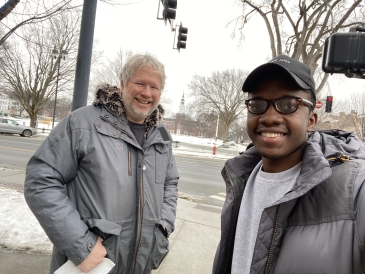

Adrian Chimboza


Breakfast with an amazing professor!
One thing that you might never know about Dartmouth College until you enroll is that the professors here really value the diverse backgrounds their students come from. As a matter of fact, they are more than excited to meet up with every one of their students outside the classroom just to learn more about them, what motivates them, how and where they grew up, and how their term has been going. This is made possible through a program called Take a Faculty Member to Lunch, which is designed to encourage undergraduate students and faculty to have substantive conversations outside of the classroom. Recently, I met up with Professor Eric Edmonds, who is an Economics professor at Dartmouth. For you to appreciate the awesomeness of Professor Edmonds I will give you a short description or background of him, courtesy of Dartmouth's Economics Department, and it reads, "[Edmonds'] research aims to improve policy directed at child labor, forced labor, human trafficking, youth migration, and human capital in poor countries. Edmonds is a Research Associate at the National Bureau of Economic Research in Cambridge, MA, a Senior Fellow at the Bureau for Research and Economic Analysis of Development, a Research Fellow at the Institute for the Study of Labor, and Editor of World Bank Economic Review. Here at Dartmouth, he created the curriculum in development economics, teaches Economics 24 [Development Economics] and 44 [Topics in Developing Economics], and is the faculty lead for the Human Development Initiative." Phenomenal, right?
I got linked with Professor Edmonds through Dr. Melinda Petre, another brilliant Dartmouth Economics professor who is taking me for ECON 1 (The Price System: Analysis, Problems, and Policies) this term. As someone who comes from Zimbabwe, a developing country, I was very eager to learn more about how developed countries like Singapore and Russia maneuvered their way from being economically unstable to being economic powerhouses of the whole world. At the same time, I wanted to learn more about what I could do with an Economics degree. By majoring in Economics, I hoped to develop skills that I could take back home and implement within Zimbabwe's government to come up with favorable policies that would allow for economic growth and investments into Zimbabwe. Noticing my passion for economics, my professor, Dr. Petre, referred me to Professor Edmonds.
On a Dartmouth, chilly, winter morning, I met up with Professor Edmonds outside Molly's restaurant, a nearby restaurant in town, to grab breakfast. We sat down, and one question led to the next. He asked me where in Zimbabwe I was from, why I was drawn to Economics, and whether I had tried skiing or ice skating. Side note: although I haven't tried either so far, I promise in my next blog post I will be balancing on skates and holding on to my dear life trying to not fall and break a bone. He explained to me that with an Economics degree, the possibilities were endless. I could venture into investment banking, research, or even consulting, among other fields. He also gave me an insight into some of the research projects he had done over the past 10 years and some of which he was currently working on. Among them included four which focused on Globalization and the Persistence of Forced Labor and Child Labor, Child Labor and Economic Development, and Trade Liberalization and the Allocation of Labor between Households and Markets in a Poor Country. He also shared with me tips about course election when it comes to Economics. It was definitely one of my memorable moments at Dartmouth.
PS. The Take a Faculty Member to Lunch program is totally free and you don't have to spend any of your money!
For more, see Take a Faculty Member to Lunch
Posts You Might Like

Read on to learn about our house cleaning days and the Alpha Theta alums I met last weekend.


Ever wanted to know what the Biology Department is like at Dartmouth? Grab lunch with Professor Dolph and me as we chat all about what to expect!


Discover the journey of professor Alan Li, who has been teaching Mandarin for over 35 years—including 20 years at Dartmouth.


In one of my previous posts, I mentioned how I joined a sorority earlier this fall by going through the recruitment process. I've come a long way since then. In fact, I am living in my sorority house for my sophomore summer!


My experience in my first ever literature class!


Dartmouth is not just a college. With world-renowned graduate schools, why would we choose to call ourselves a college instead of a university? The story behind that decision dates back to a significant Supreme Court ruling.


All about Writing 5 (and my favorite watches from the course materials!)


During my sophomore spring quarter, I took on the challenge of four STEM courses, and while it has been intense, the unexpected connections across subjects and the joy of learning have made it one of my most rewarding academic experiences yet.


Hello finals week! As I close out a finals season, dive into my bag to see just what gets me through this time of the term!
